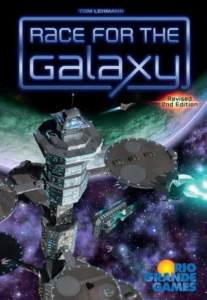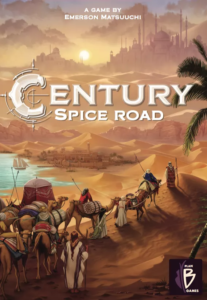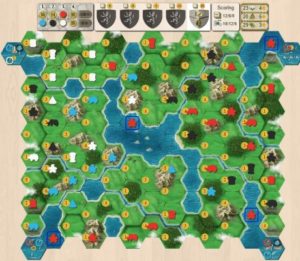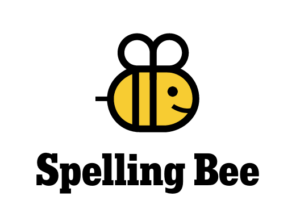Race for the Galaxy
by Tom Lehmann
[Library of Things]

view/request
Build a galactic civilization! This incredibly clever and evocative card game (for 2-4 players) has you exploring, settling worlds, developing industries, and producing and trading goods. It’s a competitive game, but interactions with your fellow players are limited. There is a lot of skill involved and there are opportunities to affect your fellow players. Your resources are cards you draw from a facedown pile, so there is no competition there—but each turn you choose a phase to play, and all players get to benefit from that phase. The trick to coming out on top? Choosing phases that benefit you more than they benefit the other players! Each phase—explore, develop, settle, consume, and produce—has its uses, and the player that chose the phase gets a special bonus. It’s a fun mechanic, and one that can be quite exciting as the game nears its end—on the last turn, will you get a chance to both settle and develop? You can only choose one!
The game cards are rich with information: the cost to play them, the points they are worth, and symbols and text indicating what bonuses they give during each phase of play. The system of symbols is elegant and concise but takes some getting used to—the game comes with a large reference card for each player that you will find useful when learning the game, in time you will realize you don’t need it any longer, but it is invaluable when learning the game. The game cards also have wonderful art which I continue to enjoy game after game.
One of the best things about this game is its simple mechanisms and setup. There are only two components: cards, and victory point tokens. Victory point tokens represent extra points at game end. Cards are multipurpose and represent everything else in the game. Cards are your currency—you discard cards from hand to pay for things. Cards are your worlds and developments—when you settle or develop you pay the cost and place the card in front of you, adding it to your civilization. And cards are the goods produced by industry and traded in commerce—a card placed under a world is a good which you can trade (discard to draw more cards into your hand) or consume (discard to draw more cards or gain victory point tokens).
It’s also a pretty quick game once you are familiar with it. My girlfriend and I play often, and we almost always play multiple games in a sitting. Why not? The game is out, quick to setup, quick to play, and it’s lots of fun!
Reviewed by Ben
Tagged: Board games, Game, Science fiction, Strategy
Century Spice Road
by Emerson Matsuuchi
[Library of Things]

view/request
Century Spice Road is a wonderfully simple and compelling game for 2-5 players. I love it. Here are some of the best things about it:
- Setup is quick–not much more than just shuffling two decks of cards and counting out a few tokens
- The game is easy to learn and quick to play
- The competition is low key
- The art on the cards is beautiful and the pieces (wooden cubes, metal coins, and plastic bowls) are tactilely satisfying
- It’s a deck building game of sorts, but it is refreshingly different from other deck building games I’ve played
- The gameplay is fun whether you win or lose
The premise is that you are a merchant, trading in spices. There are four types of spices in the game, each represented by wooden cubes of a specific color: yellow for turmeric, red for cayenne, green for cardamon, and brown for cinnamon. Market cards let you acquire or trade spices and spices can be traded for victory point cards. The trick is that you must have the have the right spices to pay the card’s cost. That victory card that is worth 20 points may be very tempting, but how are you going to obtain the five cinnamon cubes necessary to pay for it?
Everyone starts out with the same two market cards and a few cubes of turmeric and players compete to acquire market cards and victory point cards from an ever changing supply–each time someone acquires a card the cards to the right of it are slid left and a new card is dealt in the rightmost spot. Some clever mechanics ensure that their is generally an incentive to acquire the leftmost cards (the leftmost victory cards come with coins for bonus points and the leftmost market cards cost the least) which encourages turnover in the supply.
The gameplay can vary a great deal from game to game and there is no one winning strategy. Do you have a good way of obtaining new spices? Are your trades efficient? Are you able to easily obtain any spice you need or do you find yourself with a glut of cayenne or turmeric without a good way of obtaining the other spices you need? It’s different every game.
I very much Century Spice Road. Borrow it from the library and give it a try!
Reviewed by Ben
Tagged: Board games, Game, Strategy
Pandemic (Board Game)
by Matt Leacock
[Library of Things]

view/request
Though we all may be sick of the subject matter, this team-style board game is a great way to escape from the pandemic by defeating it! This game has elements of Risk and other strategy games but would appeal to a group of friends or a family that want to work together instead of against each other to take down a global virus that spreads with every roll of the dice. Roles for players to take on include Epidemiologist, Field Operative, and Containment Specialist and the Geography of the world is explored from Manila to Lagos to Bogata to Miami. This fast-paced, cooperative, addictive game will be a favorite both pre and post pandemic.
Reviewed by Elizabeth
Tagged: Board games, Cooperation, Game, Strategy

view/request
Board Game Arena advertises itself as “the world’s largest online board gaming community”. It is a community built and run online game platform with over 150 games, from classics like Hearts and Chess to more modern games like Sushi Go and Carcassonne. You can play with friends (playing with friends while on a simultaneous video chat is the closest I’ve come to a board game night during quarantine) or with strangers. On my own I’ve been playing lots of Race for the Galaxy, Hearts, and Seven Wonders. With friends we’ve played Sushi Go and Can’t Stop. It’s a good time. I recommend it for anyone who would like to play board games with friends during quarantine or anyone wants to satisfy a board game itch when an in person game isn’t possible.
Reviewed by Ben
Tagged: Board games, Game
Spelling Bee
by The New York Times
[Online Resource]

view/request
Like most librarians, I love words and games that involve language. This new one from the New York Times challenges you to come up with as many words as you can using just the 7 letters they provide. You can play it in fits and starts and it’ll track your progress throughout the day, making it very user-friendly during this strange, interruption-filled and routine-free time we’re currently living in. And lest you become too impressed with yourself, Spelling Bee has a rating system, from “Beginner” to “Genius”, to put you in your place.
Reviewed by Sarah
Tagged: Game





